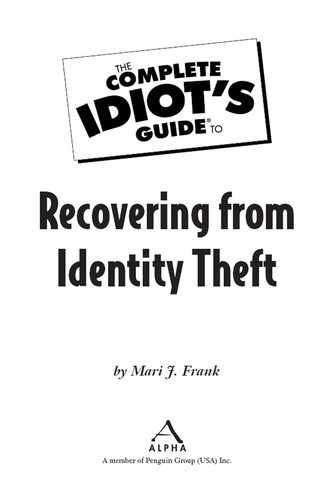Handling Familiar ID Theft
The emotional toll of family or friend identity theft is incalculable. When you have been betrayed by someone close to you, you feel you cannot trust anymore. You feel torn inside as you debate what’s fair to you and what others may tell you to do to protect the fraudster. It may help to know that you have some choices in how to handle the identity theft. These are as follows:
♦ If the family member is estranged or if the impostor was a former friend, then treat the identity theft as you would a stranger, including reporting to the authorities, no matter what the consequences for the thief. In most cases of identity theft, the victim has no idea who the thief is, but in your case, you have caught the impostor “red-handed.”
♦ Get the thief to accept responsibility and convince the creditors to transfer the debt to the impostor’s Social Security number, so that he is accountable and your name is cleared. They may not want to do that because the fraudster’s credit is probably poor. If they ask you to pay it for them, or they pay through you, it still remains on your credit report.
♦ Although I never recommend this option, some victims who called had gritted their teeth and assumed the debt as though it were their own. Although angry, some victims accepted the long-term financial and emotional consequences. At that point, when victims call me upset at what they have done, I cannot help them and can only suggest counseling about their issue of co-dependence.
The choice of how you deal with the family perpetrator will depend on the circumstances; what is most important to you; and if the identity thief finally is willing to act honorably as well as admit the misuse of your identity. If the thief is a present or former spouse, then look at the section at the end of this chapter.

Identity Crisis
If you wish to help the family member to be responsible and also take care of yourself, you have some options. But I recommend that under no circumstances should you pay any of the family fraudster’s bills in your name. Some victims have worked out a signed agreement with the family perpetrator for repayment. But I don’t believe that is an acceptable solution. Once you pay any of the money owed to creditors in your name, you’ve accepted responsibility for the charges and bills as though they were your own, and those accounts will appear on your credit reports for seven years if you don’t dispute them as fraud. If your impostor has filed for bankruptcy in your name, it will be on your reports for 10 years and your financial reputation is ruined. So no matter how close you are to the perpetrator, don’t let yourself be abused.
Take No Prisoners
The title of this section is tough, but I feel strongly that an identity thief who is an estranged family fraudster or now-former friend should be treated like the criminal he truly is. What the thief did was wrong and was done without consideration of your reputation or your finances. Perhaps worse, it may have given you a criminal record. This firm approach is not painless. The fraudster’s family and friends will try to get you to be merciful. But if the person you know committed this crime and gets away with it, he or she will probably do it to someone else. You should not feel guilty taking all measures to restore your identity.
Keep a few other things in mind, too. Even if you make a report to law enforcement, chances are that the police will not investigate or arrest the identity thief, particularly if he or she is a relative. It will be a challenge even getting an identity-theft report. If law enforcement does decide to investigate, prosecution becomes even less likely because the district attorney’s office and federal prosecutors have much bigger cases, unless your impostor defrauded other victims.
To escape from the nightmare of identity theft, you must be diligent. To refuse to work with police or in-house investigators of defrauded companies will make you look guilty in the eyes of others. If law enforcement won’t take a report, you’ll look guilty to the creditors.
Push to get at least an informational report, as Chapter 2 explains. Any time a creditor asks whether you will be willing to prosecute a relative or friend, answer as follows: “I am cooperating fully with law enforcement. I have no control over whether law enforcement investigates or arrests the person, nor whether the district attorney will prosecute.”
You may remind the creditor that it is a victim and should make its own police report as well. Do not be intimated by in-house credit investigators; the creditor is just looking for an excuse to make you pay the money stolen by the impostor. Be polite, but be firm. If a company tries to tell you that you will have to pay if your family impostor will not, tell them that it is not the law and not true because you are a victim under FCRA and they cannot make you pay for authorized purchases.

Information = Power
If local police will not issue a report, tell them that the Fair Credit Reporting Act requires that you get a report to regain your identity. If that doesn’t work, remember that you have alternatives to obtain an identity-theft report. If the thief used the mail (for example, had credit cards delivered by mail), you may call your local Postal Inspector. If your Social Security number was used, call your local office of the Social Security Administration (Chapter 2).
Bargaining with Creditors
If your guilt, or the thief’s pleading, or your family members’ disapproval is too unbearable, there is an alternative. If the impostor is willing to be accountable and honest and accept the debt as his or her own, this approach should suffice. Tell your impostor that if he or she is honest and takes responsibility, then that should be enough for you to clear your name. On the other hand, let him or her know that if he or she does not deal with the creditor, then you must get an identity-theft report according to FCRA requirements for you to clear your name with the CRAs and the creditors. You will be forced to protect yourself any way you can. The fraudster’s admission to the creditors along with a promise to pay will help to get the creditors to remove the accounts from your credit files. This is not extortion; it is explaining the consequences.
The identity thief must voluntarily sign a notarized affidavit accepting responsibility for the debt, and explain that you did not authorize the use of your Social Security number and you received no benefit. He or she must provide a copy of a government-issued ID, a utility statement, and a copy of the affidavit explaining what he or she did (and why, if it’s a sad story).
The impostor must give his or her Social Security number, agree to assume all responsibility for the debt, provide all his contact information, and ask the creditor or agency to communicate with him. Make sure your impostor gives you a copy of all the documentation above for you also to send along with copies of your FTC affidavit and government-issued ID. You must send this to the fraud department return receipt requested. You will send this letter to the creditor and any other entity involved in the scam, as well as the CRAs telling them of the fraud. Demand that your credit be cleared and the real culprit be held responsible.
You are asking the creditors to accept that the thief, not you, is responsible for the fraud. It is a deal between the creditors and the thief, not between you and the thief. The creditor would have to agree to no longer coming after you with this evidence of fraud and, instead, transfer the debt from you to the thief. This may sound like a fine solution, but it has some thorny problems:
♦ Without filing a complaint with law enforcement and getting an identity-theft victim report, you may be denied your legal rights under FCRA.
♦ Federal law does not obligate creditors to accept an admission from the identity thief. If the thief has no money, the creditors will be reluctant to transfer the debt. So they may tell you they can’t do anything without a police report. I suggest you get the police report and show the police the fraudster’s affidavit. Since the impostor is willing to take responsibility, it is very unlikely that law enforcement will refer the case further, even if the creditor files its own police report. In essence, the fraudster is agreeing to make restitution to the company.
♦ Creditors may be suspicious of a friend or relative claiming responsibility for what another seems to owe, which is why he must say that you did not authorize the use of your credit and received nothing.
♦ Creditors have a disincentive to let you off the hook if they believe they’re more likely to get money from you than from someone who’s broke and has already committed fraud.
♦ Once an entity accepts the fraud claim, even if the thief stops paying, the creditors cannot legally come back to get the money from you. Once the account is deleted from your credit report due to fraud, under FCRA the creditors cannot re-report the account on your credit profile.
♦ Creditors cannot demand the entire owed amount be paid before they release you from responsibility if you have proven the fraud. So if your impostor doesn’t pay all agreed installment payments, the company can only go after him or her.

Identity Crisis
If the identity thief is unwilling to accept formal responsibility and sign a notarized affidavit admitting the fraud and assuming the debt, then the approach above will not work. If the impostor won’t be honest and take responsibility, tell him that you are forced to protect yourself and will file a police report, telling law enforcement and the companies what you know, and proceed to restore your good name as though you didn’t know the thief.
Giving In to Guilt
If the fraudster is your own son or daughter, or mother or father, you may experience enormous pain and guilt even if the impostor refuses to take responsibility. To me, paying the impostor’s bills and ruining your financial life and hard-earned reputation is not acceptable. It teaches the family member that crime pays, and it leaves you saddled with the credit stigma for the next seven years or more.
Even if family or friends beg you not to hold the thief accountable, and they are willing to pay all of the debt, remember that the negative marks on your credit report won’t go away just because the debts are paid. There may be numerous late payment and collection accounts. If family members are willing to pay for the fraudster, work out an agreement with the company and the family members.
Encourage the family members to also pay for a lawyer to work out an agreement with the company, the fraudster, and you regarding the pay-off. I suggest that the family members get all the money to pay off the fraudulent debts at the time of signing of the agreement so there won’t be any breach later. The agreement should include that you, as the victim, are not responsible and that all the fraud will be deleted in your name and that the payment in full is complete restitution.
..................Content has been hidden....................
You can't read the all page of ebook, please click here login for view all page.
